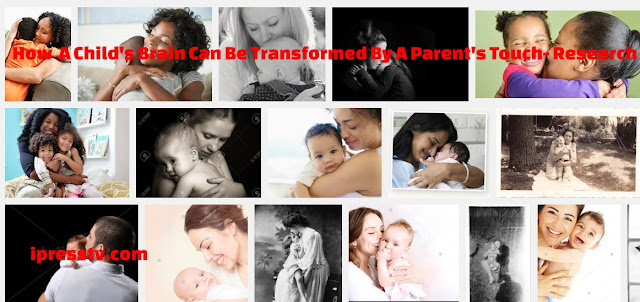A baby wants to be held, hugged, carried and touched from the day it was given birth to. A parent’s tender touch does a lot, from promoting a baby's healthy growth to developing the baby's brain later on in life, a new research proposes.
For various animals, touch is a powerful communicator of feelings, a beacon of a bond from parents to their babies . To an infant, a parent’s affection can be as essential as milk, as the newborn primates in Harry Harlow’s remarkable tests in the 1950s revealed to us when they hold on to a soft dummy although their milk came from another place.
So many years following the popular monkey love tests, scientists in Singapore and Germany utilized brain imaging to verify if receiving a lot of affectionate touches changes the human brain in any fathomable way.
“We investigated if the fondness parents show on their kids has consequences exceeding human bonding and alters functional features of the growing brain,” scientists Annett Schirmer, Jens Brauer, and their associates noted in a research issued in the August edition of Cerebral Cortex.
The scientists gathered around forty kids of about age 5 and their mothers, then asked each mother and their kid to play with the Playmobil Farm toys in a time frame of about 10 minutes. The scientists observed and computed the number of times each mom touched their child and how frequent the child touched their moms.
A few of days later, the scientists examined the brain of each child while she or he was at rest to understand its activity designs. Their focus was on the “social brain” ---which means , the amount of neuronal networks that enable people to relate with a person individually than we do with, for instance , an orange. It is what is at play when we act socially when we are curious about other individuals and try to see life through somebody else’s perceptions.
Scientists saw that brain movement across these networks was powerful for children who get plenty physical attention from their parents.
It is relatively improbable to undeviatingly authenticate a cause-and-effect relationship connecting a touch and brain development in human beings (scientists can not deny a baby of parental affection to see what happens), but studies involving animals insinuates such a causal connection exists, Schirmer said.
The new investigations were taken from one piece of time in the kid's lives, though it is possible that the more tactile moms have perpetually been that way, and have continued to boost this brain improvement since their children were given birth to.
“We can only hypothesize that this is the fact. However, our studies carefully adjust to facts from non-human mammals,” Schirmer said. “Therefore if what occurs in humans connects to what occurs in mice, then yes, the function of the body and the functionings of the social brain are being altered throughout the development by the quantity of touch children receive.”
“Take note, nonetheless, that touch is apparently one of many things in a baby's conditions that develop social functioning,” Schirmer added.
A tender, loving touch enters the brain via a set of nerve networks in the skin named c-tactile afferents. Some experts think this special collection of nerves has developed in social species, from rats to humans, and may be essential in the development of the social brain. These nerve fibers, identified later than temperature-sensing and pain nerves, react best to slow strokes and touch. They are seen often on the back of the body and seems not be present on the palms of humans. When stimulated by slow soft touch, the nerves causes a monument of hormonal outcomes in the brain, animal studies postulates.
Harlow’s monkeys upturn a general school of thought in the beginning of the 20th century that sees unconditional affection as damaging to a baby's usual mental health and upbringing. We now understand that as a proper-papered social class of mammals, man is born with a brain longing to seek and develop social bonds.
However, some social capabilities many of us do not take so serious, such as the capability to visualize another person’s perspective and thoughts , do not even begin manifesting until about the age of four or five. This implies that the social brain we began with nevertheless needs more years of learning, from the time of birth to the time of adolescence, and until when we are to fully grown.
“Touch is an essentially primary caretaking behaviour that can have substantial advantages for our children,” Schirmer stated. “If newborns and young kids seek tactile compassion from their parents, their parents should lovingly satisfy them.”
